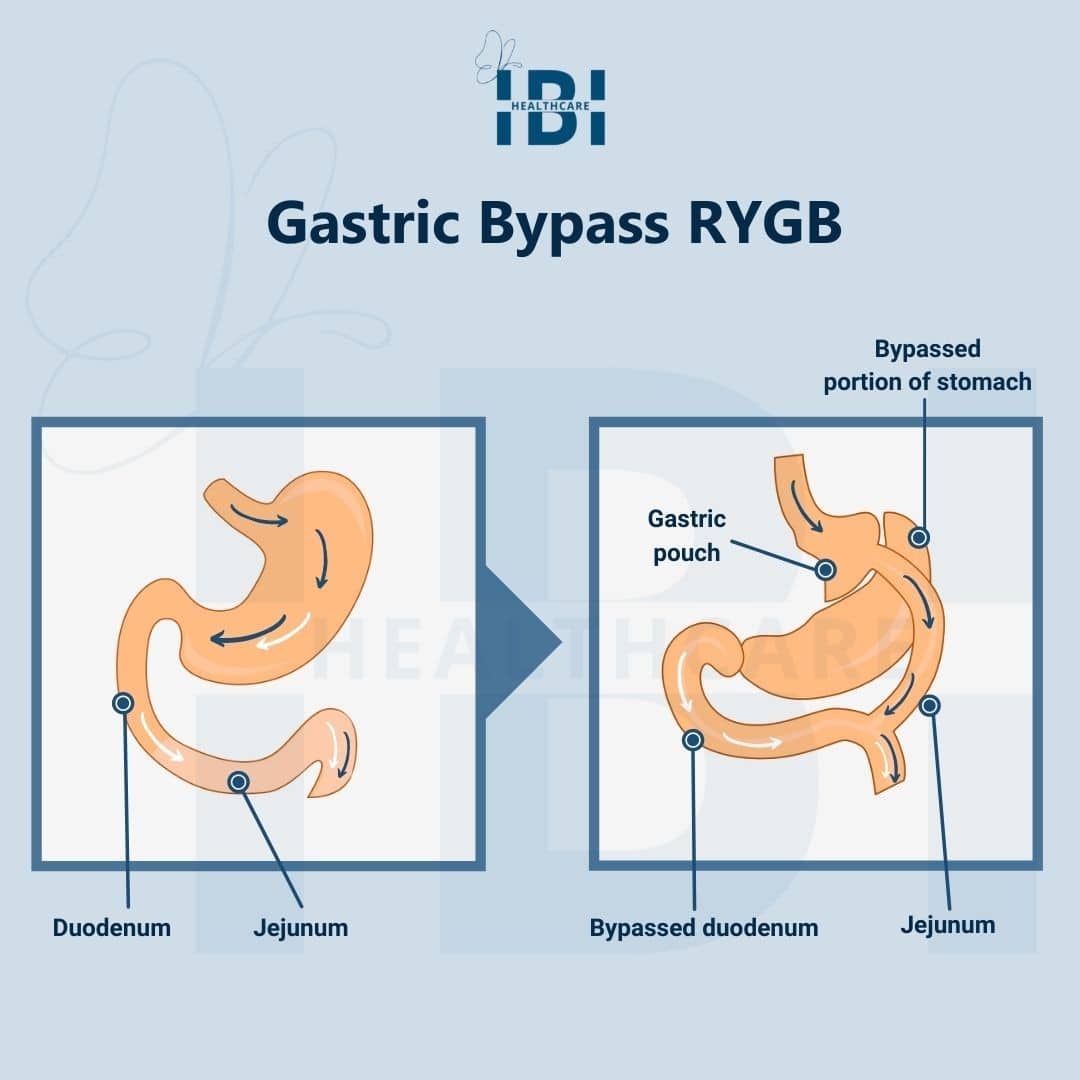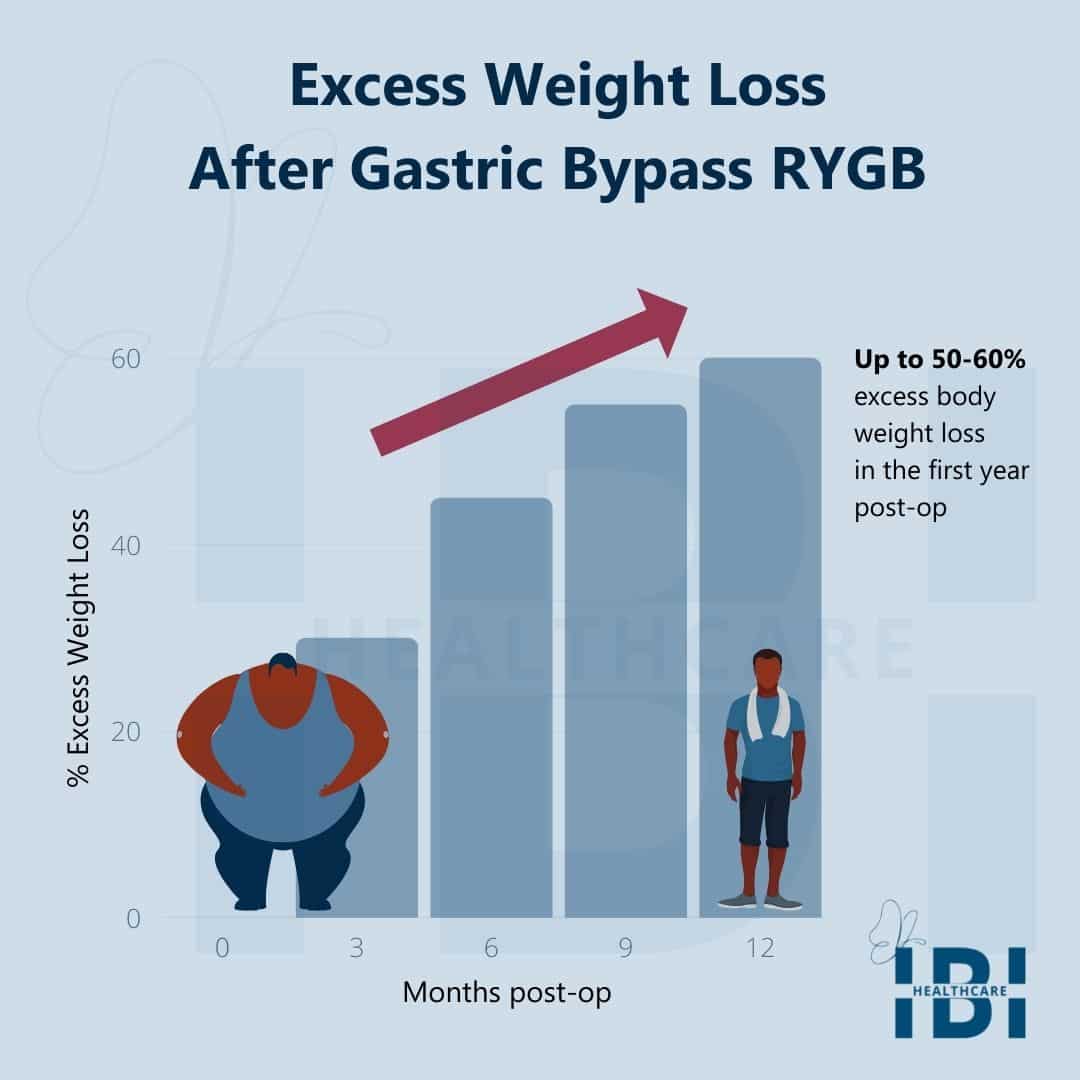What is Roux-en-Y Gastric Bypass?
Surgeons perform Roux-en-Y Gastric Bypass or RYGB (the medical abbreviation) to help individuals with higher body weight lose weight. Regardless, traditional diet and exercise have been unsuccessful.
On the other hand, gastric bypass surgery alters the stomach size and re-routes the digestive system. However, the surgeon divides the stomach into two sections making the top section much smaller. Consequently, surgeons re-route a section of the small intestine and connect it to the newly formed pouch.
Thus, the pouch will now allow the food to travel directly into this portion of the small intestine. “Bypassing” the rest of the digestive system. Absorbing fewer calories, therefore, results in significant weight loss.
Gastric Bypass is the Gold Standard

What does a Medical Weight Loss Program include?
- Surgeons perform a Mini Gastric Bypass very similarly to traditional bypass surgery.
- However, the technique is the main difference between the two surgeries.
- Mini bypass involves bypassing a larger portion of the small intestine with less intestinal rerouting.
- Furthermore, a mini bypass diminishes the risk of complications.
- Because the procedure involves fewer steps.
Why Consider this Procedure?
Gastric bypass surgery helps individuals with a heavier weight or extremely high BMI to lose weight.
Simultaneously, lessen the risks associated with weight-related and life-threatening health problems, such as:
- Stroke.
- Cancer.
- Sleep Apnea.
- Heart Disease.
- Type 2 Diabetes.
- High Blood Pressure.
- Gallbladder Disease.
- Depression and Anxiety.
- Decreased Quality of Life.
- High or Low Cholesterol issues.
- Osteoarthritis (cartilage breaks down in the joints).
- Chronic Body Pain and decreased Physical Functioning ability.

How Much Weight Can You Lose with the Procedure?
Typically, patients lose between 50-60% of their excess weight the first year after surgery. To calculate excess weight, subtract the ideal weight or goal weight from the current weight.
Moreover, the patient weighs 350 pounds. With a goal weight of 150 pounds has 200 pounds of excess weight. Hence 350 – 150 = 200.
Additionally, after Roux-en-Y gastric bypass surgery. This patient will typically lose between 100 and 120 pounds in the first 12 months. Hence 200 x 50-60% = 100-120.
Nonetheless, patients who continue to follow their dietary plan and new lifestyle choices. They should reach their final goal in about 24 months.
Who is a Candidate for the Procedure?
Granted that the basic criteria for gastric bypass surgery are:
- A body mass index (BMI) of 40+.
- A BMI of 35+ and you suffer from serious weight-related health issues. For instance high blood pressure, type 2 diabetes, and sleep apnea.
- Sometimes patients with lower BMI numbers (30-34) can qualify if they are experiencing serious health issues related to their weight.
In addition to the physical qualifications for Roux-en-Y gastric bypass surgery. Without question, patients must dedicate themselves and commit to making permanent lifestyle changes. Nevertheless, patients may also need to participate in long-term follow-up care, which may include overseeing nutrition, exercise, and lifestyle. As well as monitoring medical conditions.
How much does Roux-en-Y Gastric Bypass Cost?
We are currently offering the Roux-en-Y Gastric Bypass (RYGB) procedure at a reduced rate. Therefore, take advantage of our limited-time special pricing.
Above all, IBI Healthcare Institute offers a self-pay, all-inclusive price. In some cases, we could reduce the exact cost of bypass surgery. Particularly, based on insurance, health status, and the use of additional resources. Concurrently, offers financing options for qualified patients.
In fact, the cost not only includes the price of the procedure. But more importantly, the skill and expertise of the specialist or healthcare professional who is performing it.
Roux-en-Y Gastric Bypass Diet Plan
These guidelines are to help you choose, prepare, and eat foods before and after gastric bypass surgery.

Roux-en-Y Gastric Bypass FAQs
When Will I Start Seeing Results from Gastric Bypass?
After your RYGB surgery, you will begin to lose weight very quickly. Because of the way the surgery alters the digestive system. Although, there are three reasons gastric bypass helps patients lose weight are:
- Firstly, the procedure makes the stomach smaller, restricting the amount of food that one can consume at one time.
- Secondly, the surgeon alters the digestive system to prevent it from absorbing all of the calories. Reducing ingested calories contributes to significant weight loss.
- As a result, during the surgery, the reduction of the stomach also reduced the production of ghrelin. Afterward, ghrelin is the hormone that creates hunger pangs and tells us we are hungry. Typically, patients who have had bypass surgery will feel “full” longer.
Does Gastric Bypass Have Any Associated Risks?
Conversely, as with any surgical procedure, gastric bypass has associated risks.
Although rare, some possible risks include:
- Risks related to the anesthesia used during surgery.
- Infection.
- Acid Reflux.
- Anastomotic Leak.
- Stomach Obstruction.
- Dilation of Esophagus.
- New Food Sensitivities.
- Chronic Nausea and Vomiting.
Long-term risks can include:
- Ulcers.
- Vomiting.
- Malnutrition.
- Low Blood Sugar.
- Bowel Obstruction.
- Dumping Syndrome – a condition that can lead to symptoms like Nausea and Dizziness.
Is Roux-en-Y Gastric Bypass Reversible?
Certainly, gastric bypass surgery is reversible. However, it can cause rare but serious complications. Having said that, the procedure for reversal is risky.
How Do I Know if Gastric Bypass is Right for Me?
Indeed, to determine if gastric bypass surgery is suitable for your weight loss needs. Consult with an expert in bariatric surgery and weight loss. In any case, the surgeon will know which procedure is right for you. For instance, when comparing RYGB vs Sleeve Gastrectomy. How do you know which will offer the most weight loss potential?
Gastric bypass surgery subsequently restricts your food intake. But also limits how many calories your body can absorb. Whereas sleeve gastrectomy (gastric sleeve) only restricts the amount of food you can eat. Finally, gastric bypass (RYGB) surgery offers greater potential to lose weight fast. But it also has a higher risk profile than gastric sleeve.
Henceforth, if you are considering gastric bypass surgery to help you with weight loss. Contact us today to determine your best option. Affirmatively, IBI Healthcare Institute helps you navigate through the entire weight loss process. The process also includes choosing the procedure best for you. Nevertheless supporting you through the process to continue your weight loss journey.
How Long Will the Results from Gastric Bypass Last?
Gastric bypass surgery, like other weight-loss surgeries, has the potential to yield life-long results. Meanwhile, your new lifestyle is jumpstarted with the surgery, which is just one component of the weight loss process and serves as a tool.
Besides, the patient mainly holds the keys to continued weight loss success and maintenance. Whereas, dedication and commitment to following dietary restrictions, an exercise program, and implementing lifestyle changes are what are going to determine long-term success.






